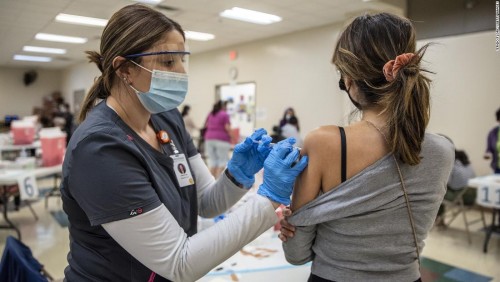The latest findings, from a long-running study by scientists at Imperial College London and market research company Ipsos MORI, were based on 98,233 swabs taken between June 24 and July 12.
They showed one in 160 people infected with coronavirus, with a prevalence rate of 1.21 percent for unvaccinated respondents and 0.40 percent for those fully jabbed.
The study also found double-vaccinated people may be less likely to pass on the virus to others than those who have not received a vaccine.
However, officials and scientists in Britain have urged caution after the government eased all virus curbs in England on July 19, including the legal requirement to wear masks in certain indoor settings.
A US government document leaked last week warned that infections among fully vaccinated people are not as rare as previously thought and that such cases are highly contagious.
Paul Elliott, a professor at Imperial's School of Public Health and director of the survey program, said the findings "confirm our previous data showing that both doses of a vaccine offer good protection against getting infected".
"However, we can also see that there is still a risk of infection, as no vaccine is 100 percent effective, and we know that some double vaccinated people can still become ill from the virus.
"So even with the easing of restrictions, we should still act with caution to help protect one another and curb the rate of infections."
Even India is experiencing a sharp spike in covid-19 cases after months of numbers dropping. The rise comes as India celebrates festivals like Holi, religious functions like the Kumbh Mela, and with five states currently involved in elections.
The country's pandemic curve had been flattening by January and February this year but has taken a sharp upward turn since March. On 27 March, India's confirmed active cases on the day were 62,632, the highest seen since October 2020.
Globally, India has had the third highest number of confirmed cases and deaths from covid-19 after Brazil and the US. As of 29 March, India had 12 million cases and 1,62,000 deaths from the disease.1
Last week, the Indian government acknowledged a "surge in covid-19 cases" and asked states to focus on "stringent containment and public health measures" including increasing testing, tracing, and vaccination. A press release from the government2 put the onus for the second wave of infections on "the laxity among everyone." The central government has asked state governments to take this surge in infections seriously, so as to not be "frittering away" the gains of last year's work to bring down numbers.
Srinath Reddy, president of the Public Health Foundation of India, said there has been a "perfect storm" of reasons for the spike. "The recent rapid upswing in cases is from a confluence of careless crowd behaviours, slackening of governmental vigil, and mutations of the virus." He said that the decline in deaths between October 2020 and January 2021, "gave rise to a popular belief that the danger has fully passed, reinforced by overly confident assertions by some experts and politicians that we have attained herd immunity."
The western state of Maharashtra contributed the bulk of active cases in India throughout the pandemic and in this current surge. As on 28 March 2021, Maharashtra had 3,20,000 active cases of covid-19, far ahead of the second highest state of Kerala, which has 24,578 active cases. According to a recent government assessment,3 Maharashtra accounts for 62% of all active cases in the country.
Indian vaccines
India's ability to control the spread of covid-19 and its demand for and supply of vaccines will impact global supply. According to government data,4 74 countries are currently using vaccines made in India. In total, India has supplied 60 million doses to the world—8.1 million have been grants to counties including Bangladesh, Bhutan, Myanmar, and Nepal.4 Some 34 million have been commercial sales, and 18 million have been given to Covax.
India began its covid-19 vaccination programme on 16 January. Initially, it was only for health and frontline workers. On 1 March, this was expanded to everyone older than 60, and those older than 45 who have specific comorbidities. So far, it has administered over 60 million vaccinations, placing it third globally after China and the US.
New variants
India began its genomic sequencing project for covid-19 last year but, according to a paper published by Indian government scientists involved in the sequencing, its pace and volume has been insufficient when compared with India's high number of cases.
A recent press statement from the government said that even though variants of concern have been found in India, they have not been detected in high enough numbers to either establish a direct relationship or explain the rapid surge in cases.
In total, Indian government laboratories have done the genome sequencing of 10,787 samples of SARS-CoV2 to look for variants, and found 771.
Another lockdown?
The Indian government has not enforced another national lockdown as it did in the early months of the pandemic, but the chief ministers of different states have not ruled it out.
In Maharashtra, the chief minister Udhav Thackeray has said repeatedly that another lockdown could be imposed if case numbers continue rising. The government has instead imposed a night curfew, restricting movement after dark. Earlier this month, the state published guidelines8 insisting that private offices continue to work from home and allowing 50% of their staff to work from office. Theatres and auditoriums have also been told to function at 50% capacity.
In Delhi, the national capital, the chief minister has said that a lockdown would not be a solution, and that people should "learn to live" with the disease instead.9 The Delhi government has announced that there will be random testing for SARS-CoV2 at public places. The civic corporation in Mumbai, the capital city of Maharashtra, has said the same.
Fines for not wearing a mask have increased in some states. Many states insist on a negative RT-PCR test result for covid-19 in order to be allowed entry into the state via flight or road. Public gatherings like weddings have been given caps on how many guests can be allowed. Festival celebrations have been barred11 in public, although the restriction has not so far been strictly enforced.

Fully vaccinated people in England were one-third as likely to test positive for COVID-19, according to an ongoing survey of the population released on Wednesday.




